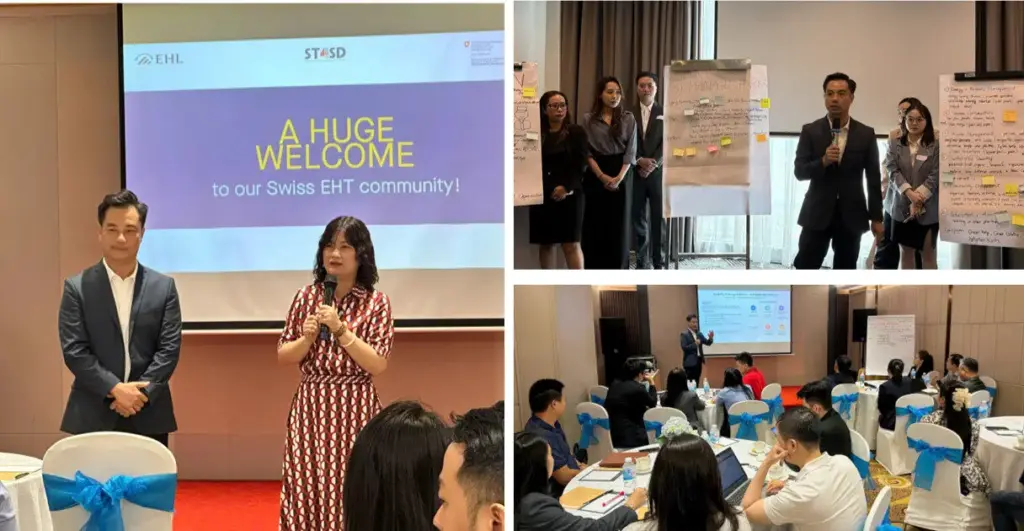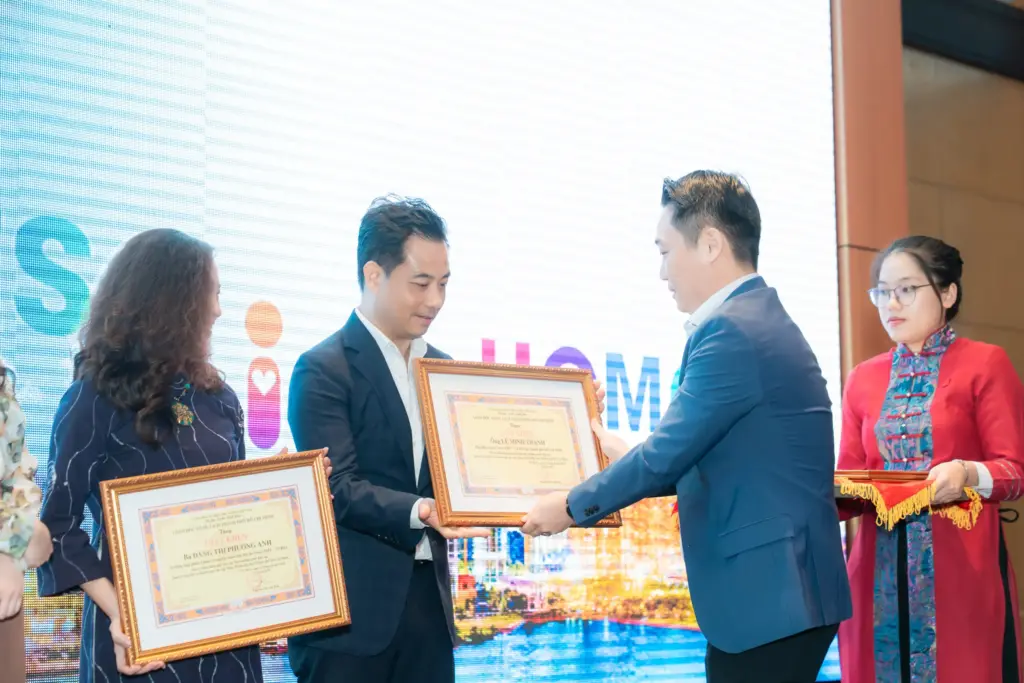
As part of the journey to improve the quality of human resources in Vietnam’s tourism and hospitality industry, the Swiss Executive Hospitality Training (Swiss EHT) program – developed by the EHL Hospitality Business School in collaboration with the ST4SD project – has introduced a modern, flexible, and highly practical training model. With his role as a lecturer and program coordinator in Ho Chi Minh City, Mr. Le Minh Thanh has gained valuable insights in implementing this blended learning model, especially in digitalization – a defining feature of Swiss EHT.
In the interview below, Mr. Thanh shares his observations and practical experiences, and how the program helps learners shift their mindset, enhance their skills, and develop comprehensively to meet the increasing demands of the modern hospitality sector.
The ST4SD project is funded by the Swiss State Secretariat for Economic Affairs (SECO) with the aim of promoting sustainable and inclusive tourism development in Vietnam. The project is jointly implemented by Helvetas Vietnam and CRED, with the Vietnam National Authority of Tourism (VNAT) appointed as the project owner by the Ministry of Culture, Sports and Tourism.
From your role as a lecturer and program coordinator in Ho Chi Minh City, how do you evaluate the “digitalization” aspect of the Swiss EHT training model?
With experience implementing the program in Ho Chi Minh City, I see digitalization as one of the outstanding strengths of the Swiss EHL training model. Instead of relying solely on traditional paper-based materials, the entire knowledge platform is built on high-quality, well-structured digital learning modules. This ensures all learners, wherever they are, can access a consistent, up-to-date, and world-class training program that meets EHL Switzerland’s standards.
More importantly, we don’t stop at providing digital materials. The Swiss EHL model promotes an active blended learning approach. The digital modules provide foundational knowledge, while also including tasks requiring learners to conduct deeper research using online tools. For example, learners are encouraged to explore a hotel’s website or investigate hotel star rating standards in Vietnam. This approach fosters self-learning, critical thinking, and technological application—essential competencies in today’s hospitality industry.

Le Minh Thanh delivered a training for the Swiss EHT program
Compared to traditional training programs in Vietnam’s tourism and hospitality sector, what are the notable advantages of the EHT’s online self-paced component?
The breakthrough of the Swiss EHT program lies not just in the quality of its e-learning modules, but in how they are used to implement the Flipped Classroom model. This modern teaching method helps optimize learning time and significantly enhance knowledge retention.
Here’s how it works: learners study theory at home (Online Self-Paced), and practice or interact in class. Instead of passively listening to lectures in class, learners actively study the digital modules at their own pace at home, building a solid knowledge base. This allows them to revisit complex topics like hotel classification criteria until they fully understand them. Classroom time is no longer used for lecturing but for interactive activities, where instructors act as coaches. Learners work in groups to design sustainable hotels, build organizational charts, or discuss real-life case studies. This turns classroom hours into vibrant practical sessions where knowledge is deepened, and soft skills such as communication, teamwork, and problem-solving are strengthened. Compared to traditional methods, the flipped classroom encourages active learning—students don’t just “know,” they “understand” and “apply” what they’ve learned.
In your experience teaching and supporting online learners, how have students adapted to the EHT digital learning platform? Were there any challenges and how did you address them?
From my teaching experience, most learners adapt quickly to the platform’s technological aspects—logging in, accessing materials, and using features are quite intuitive. The real challenge lies in shifting mindsets and learning approaches—from passive learning to active, self-directed learning.
Initial difficulties I’ve observed include time management, self-discipline, independent research skills, and preparation for flipped classrooms. The flexibility of self-paced learning can be challenging; some learners struggle to maintain a consistent study schedule, leading to last-minute cramming. Modules often include open-ended tasks like “Research your country’s hotel star rating standards” or “Design a sustainable hotel.” For learners used to having all information provided, this requires time to develop. Some learners are also unaccustomed to completing theoretical work at home in preparation for class discussions.
To help learners overcome these challenges, I apply various support methods: setting clear expectations from the start, transforming classes into interactive workshops, and providing constant encouragement. We explain the classroom model thoroughly from the beginning, emphasize the importance of self-study, and actively address learners’ difficulties during in-class group activities. This fosters a supportive environment where everyone builds knowledge together.
Can you share a specific example of a Swiss EHT course module or online tool that helped shift learners’ mindsets or create a different learning experience?
The course aims not only to equip learners with knowledge and skills but also to trigger a profound mindset shift. Right after the first session, learners are guided to approach their roles differently—focusing on creating authentic and unique experiences in hospitality. Live sessions serve as a catalyst, giving learners new perspectives on familiar issues. They become more aware of current challenges and are inspired with fresh ideas.
Initially, many learners come with the mindset of simply gathering materials—”my boss sent me to collect as many good resources as possible.” However, after participating in the class, their perceptions change dramatically. They realize the true value of the course lies not in the materials but in the transformation of how they think and view challenges. Some even express a strong desire to influence their supervisors’ mindsets and to share this renewed energy and vision with colleagues and future staff.

Le Minh Thanh received the Appreciation Award from the Hochiminh City Department of Tourism
for his contribution to the Swiss EHT Viet Nam
In your opinion, how does the integration of digital learning and offline coaching/workshops in Swiss EHT impact pedagogy and training effectiveness?
Pedagogically, Swiss EHT’s blend of online learning and face-to-face interaction creates a comprehensive and in-depth learning environment. The e-learning platform enables learners—especially busy managers—to fully control their learning pace and time, realizing a learner-centered approach. Once learners have a solid theoretical foundation, in-person workshops and coaching sessions push them out of their comfort zones into real-world scenarios requiring critical application of knowledge.
Interactive activities like “Gallery Walks” foster soft skill development through social and experiential learning. This combination enables profound transformation—many have said the greatest takeaway is not documents, but a new way of thinking.
In terms of training effectiveness, the blended approach optimizes resources, enhances applicability, and builds sustainable engagement. E-learning saves costs and accommodates diverse learning styles, while face-to-face sessions focus on high-value activities like problem-solving. Knowledge is reinforced through group projects and practical cases, ensuring learners know how to apply what they’ve learned. Moreover, the in-person sessions build a tight-knit learning community that shares experiences and inspires one another—spreading motivation beyond the classroom.